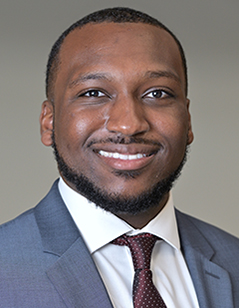Medical Research Scholar Investigates Racial/Ethnic Disparities in Physical Activity
Jeremy Huckleby’s interest in physical activity and health disparities started in high school, where he played basketball and ran on the track team. He was fortunate; he attended a high school with trainers, physical therapists, and other amenities. But his friends at other schools did not have the same resources, and he saw them continue playing through sports injuries. “This disparity of access to resources was concerning as I saw others get more injured,” says Huckleby.

Now Huckleby is a medical student, and from July 2019 to June 2020, he participated in the NIH Medical Research Scholars Program (MRSP), a 1-year program that allows medical students to engage in biomedical research related to their career goals. He did research with Anna María Nápoles, Ph.D., M.P.H., Scientific Director of the NIMHD Division of Intramural Research, between his third and fourth years of medical school at the University of Illinois College of Medicine at Peoria. His research focused on physical activity differences among African American, Latino, and White adults with arthritis in the United States.
Huckleby came across the MRSP while exploring clinical research training opportunities on the NIH website. After his acceptance into the program, he learned about a research opportunity in racial/ethnic health disparities; specifically, looking into the fact that Latinos and African Americans with arthritis are less likely to be active and more likely to have joint pain than White people with arthritis. His curiosity was sparked, and he connected with Nápoles, who was leading the research project.
Taking part in the MRSP set his medical training back by a year, but Huckleby says it is worth the delay. As an aspiring orthopedic surgeon and advocate for equitable health policies, he says, “I think participating in this program was absolutely worthwhile. My research experience at NIH has been a valuable addition to my tool belt for my future career.”
The research experience has enriched Huckleby’s training. “I have learned a different way to think. Dr. Nápoles challenged me to ask the right questions in a scientific way—kind of like solving a puzzle.” He adds, “Going forward, I think it is really going to help me in my career.”
Huckleby presented his project at the end of the yearlong program; the presentation was virtual because of the COVID-19 pandemic. Using data from a national survey provided by the Centers for Disease Control and Prevention, he found that adults who had arthritis and received exercise recommendations from their doctors were more likely to meet suggested levels of aerobic and strengthening exercises and to have less joint pain. The effects were similar across racial/ethnic groups. However, the survey did not show whether a certain racial/ethnic group was less likely to receive exercise recommendations. The results have yet to be published and are undergoing peer review.
The budding clinician-scientist looks forward to continuing his research outside NIH, despite the challenge he has experienced in finding mentorship from orthopedic surgeons who have done similar research. Huckleby hopes to get people in the field interested in understanding the factors that contribute to racial/ethnic disparities in joint pain and physical activity among adults with arthritis. For example, some of the reasons for these disparities could be physician bias, differences in physical activity recommendations and patient education, and socioeconomic dynamics. Huckleby would also like to eventually study racial/ethnic differences in psychological distress among adults with arthritis.
Huckleby says the MRSP experience gave his career a real boost. He says, “I would recommend this program to anyone who is interested in research, even with minimal experience. I received great support and was able to learn by trial and error, using the scientific method.”
The physical activity disparities that Huckleby recognized in high school opened his eyes to a field that the MRSP allowed him to explore in his early clinical research career. He plans to apply his research skills in academic surgery after he completes medical school.
Page updated November 3, 2020

















